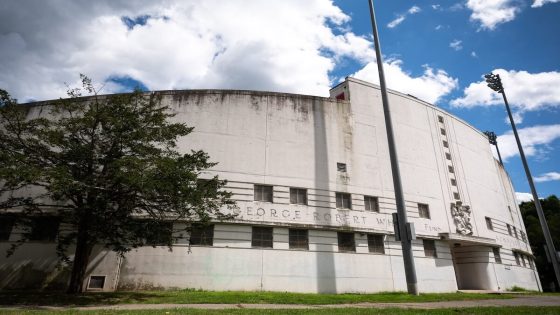Boston’s newest professional sports team has finally secured its home stadium. BOS Nation FC’s ownership group, Boston Unity Soccer Partners (BUSP), signed a lease with the city to move forward with White Stadium renovations that have been in negotiations for over a year, Boston Mayor Michelle Wu announced during a news conference Monday.
Though facing an ongoing lawsuit from neighborhood advocates and a rising price tag that’s now around $91 million, the city is moving forward with construction to make White Stadium suitable for the incoming NWSL expansion team.
“(BUSP) will help fund more than half of the construction costs, rent space and share revenues and provide community benefits annually, and carry all the costs to operate and maintain the facility afterwards,” Wu said.
“We are incredibly proud that our team’s home will be in the heart of the city through this generational public private community partnership to revitalize white stadium,” said BUSP controlling manager Jennifer Epstein. “The opportunity to renew White Stadium as our club’s home pitch is so exciting to our team because of this unique opportunity to make a meaningful difference in our community.”
When asked if the team had any backup plans in terms of being prepared to play by 2026 or considering a delay to 2027 or afterward, Epstein said, “We are certainly very focused on our inaugural season in 2026. Stadium construction will proceed at an accelerated timeline to get us on the pitch.”
Epstein added, “We are still working on, alongside the league, what works best for the league, what works best for our club and the city. We are working on an alternate site should we need it.”
Wu said the lease will “open up the largest investment into BPS athletics and White Stadium since it opened in 1949” and emphasized the project’s reach beyond the NWSL team the venue will house.
“This renovation project and ongoing lease arrangement will make White Stadium the anchor for citywide youth sports, access, revitalize community programming, deliver needed ongoing investments into our beloved historic Franklin Park, all while creating a home for the City of Champions’ newest professional team.”
While the city of Boston and Boston Public Schools (BPS) have top scheduling priority for 12 major events per year, followed by BPS and NWSL having co-priority in scheduling their games before other city or city-permitted community events, NWSL team practices and Boston community events have the lowest priority. This is crucial as league commissioner Jessica Berman has consistently emphasized the importance of teams having control of their infrastructure.
The stadium also comes with scheduling requirements including games must start by no later than 8:30 p.m. and programming can start only two hours before the game and must end one hour after the game ends, or 11:30 p.m., whichever one is earlier. NWSL games cannot take place more than two weekends in a four-week period, and no more than four weekend games per season can start before 5 p.m.
The city of Boston has published all details from the call online, including the actual lease and stadium usage agreements, but some of the most pertinent details are below:
Agreement details
- 10-year initial lease
- BUSP pays a $200,000 first season payment, prorated for the number of months the field will be operational
- BUSP pays $400,000 a year in rent starting in their second season (the first full season where the entire facility is available) escalating by three percent each year afterward
- Revenue sharing with the city: 10 percent of in-stadium advertising revenues, 10 percent of field naming rights revenue, three percent of concessions revenue
- 40 percent of in-stadium advertising revenues, 15 percent of field naming rights and five percent of concession revenues will go into a reserve fund exclusively used to maintain the facility
- $1 per ticket sold from the NWSL games goes into the Franklin Park preservation fund to implement ongoing initiatives from the Franklin Park action plan
Of note, “field naming rights” does not include the right to rename White Stadium. A city official on the call clarified that White Stadium’s name is not available for a commercial naming rights deal, but that the field and other elements of the stadium such as the scoreboard would be.
Epstein confirmed that the team has begun discussions with parties interested in those naming rights.
Construction
The city is building the areas that will be for Boston Public Schools and community use while BUSP is building the sections that are for their use.
Wu outlined several financial safeguards for the construction project in the form of guarantees from BUSP, including a $25 million construction escrow account over which the city has approval on expenditures, and a $45 million pre-financing guaranty should BUSP not be able to continue with renovations on their end.
The stadium will include a regulation-size eight-lane track and space for new field events such as shot put and pole vault.
The field will be natural grass. Wu called it “professional grade” in her comments but did not elaborate if the field would be in line with the standards of modern professional fields built in the U.S. such as those at CPKC Stadium in Kansas City or GEODIS Park in Nashville.
Required reading
- BOS Nation FC hire former FC Barcelona executive as new general manager
- Linehan: Boston NWSL club misses the mark with BOS Nation FC and marketing campaign
- BOS Nation considering name change after public backlash
(Photo: Andrew Burke-Stevenson / The Boston Globe via Getty Images)





